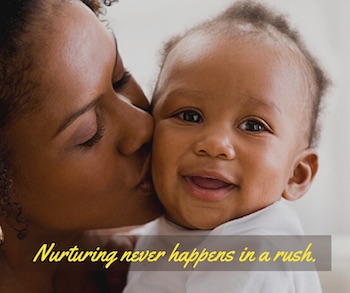Blog
Nurturing Never Happens In A Rush
Author: Kathleen Nelson-Simley
Posted: Wednesday - October 14, 2020
One of my most favorite conversations to have is about parenting. Perhaps it’s because I’ve been doing it for 31 years and I know how hard it can be, but equally, how rewarding it can be.
I’ve been thinking a lot about being a parent lately. My first-born just turned 31 years old and my daughter recently became a new 28-year-old which has left me wondering, “Where has the time gone?” In hindsight, the parenting years seem like they have passed by so quickly and yet, when I was in the “thick of it”, I could see no end in sight.
If parenting was hard for me years ago, I can only imagine how hard it is for parents today. If you are a parent yourself or work with parents, then you know first-hand that parenting isn’t easy. However, no matter if you were an active parent years ago like me or are one today, the research on the most effective parenting strategies hasn’t changed much over time. All the parenting books and articles I was reading years ago were telling me to do a lot of the same things parents are being told to do today.
Simply put, there are some parenting strategies that have survived the test of time and one of those is the importance of creating a nurturing and loving relationship with your child. It is so important that some researchers call it the "super-factor" of parenting. The earlier you have established this kind of relationship with your child, it makes using the other parenting strategies that are important easier and more effective.
For many people the term, nurturing parenting, conjures up childhood memories of our parents and other adults caring about us with their compliments and their actions. We knew on some level that we were being nurtured when our parents told us they loved us, took time to listen to us and showed interest in our thoughts and feelings, comforted us when we were hurt or sad, laughed with us when we were happy or acting silly, played with us and set rules and guidelines to keep us safe. We knew we were loved. We were being nurtured.
All children need to feel important, loved and connected. Unfortunately, some children grow up not having a nurturing or loving relationship with a parent. For these children, having a nurturing relationship with another adult, such as a grandparent, aunt or uncle, teacher, coach or maybe even you, can be just as important and beneficial.
Good nurturing starts with an attitude and a deeply held belief that warmth is critical for success as a parent. It involves loving looks, friendly conversations in a warm and caring voice, smiles, sharing feelings, encouragement, empathy, empowerment and unconditional acceptance and love. Nurturing adults also give the gift of their time and attention.

A healthy, nurturing relationship with your child is built through countless interactions over the course of time. It requires a lot of energy, work and consistency with no one “right way” to do it. The outcome is what we all need to be working towards, but how we acheive it will vary from family to family and from child to child. Here are some suggestions to get you or other parents started in discovering how to become a nurturing parent:
• Express love and pride often.
• Write notes of encouragement, praise and love. Slip them into the child's lunchbox, backpack or under their pillow.
• Remember the power of appropriate touch. Give a loving hug, comforting hand squeeze or pat on the back.
• Give your undivided attention when children are talking. Stop what you are doing, look directly at the child and listen attentively.
• Ask questions of interest about their activities, school day or friends.
• Attend their activities not because you have to, but because you want to.
• Eat meals together and use the time to talk about each other's day and activities.
• Spend time one-on-one with each other and do something they would enjoy.
• Turn the TV off and silence all phones at least one night a month and do something fun together.
• Tell them how much you appreciate them.
• Draw attention to their talents and good behaviors.
• Teach them to do new things.
• Read to or with them.
Nurturing children is about the way we love them...the way we bring them up. If you’re a parent, there isn’t a greater compliment that you can receive from your children than to hear them say, “My parents really care about me. They really love me. They are there for me through the good and bad times.” That’s what nurturing is: love, caring and steady support through the good and bad times. Lots of love given freely. No, “I’ll love you if … or I’ll love you when …,” just “I love you.”



